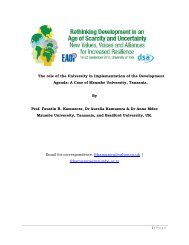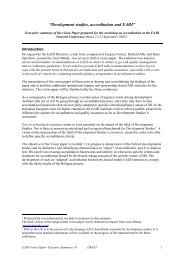Revenue Administration in Sub-Saharan Africa - International Tax ...
Revenue Administration in Sub-Saharan Africa - International Tax ...
Revenue Administration in Sub-Saharan Africa - International Tax ...
Create successful ePaper yourself
Turn your PDF publications into a flip-book with our unique Google optimized e-Paper software.
A. Enforcement powers of revenue bodiesIntroductionThere is anecdotal evidence that tax arrears are a grow<strong>in</strong>g problem <strong>in</strong> most SSAcountries. Yet, more often than not, revenue bodies seem helpless <strong>in</strong> deal<strong>in</strong>g with thisproblem. The survey sought to review powers available to revenue authority to enforcepayment of tax, gather <strong>in</strong>formation and impose penalties and <strong>in</strong>terest.Survey resultsDebt management (Table 25)• All the surveyed revenue bodies <strong>in</strong>dicated they have sufficient powers toenforce payment of tax, <strong>in</strong>clud<strong>in</strong>g the powers to:(1) engage the taxpayers and agree on a reasonable payment schedule;(2) use tax clearance certificates to bar debtors from undertak<strong>in</strong>g bus<strong>in</strong>essactivities with government agencies;(3) place a lien over debtors’ assets;(4) collect the debt from third parties that are do<strong>in</strong>g bus<strong>in</strong>ess with the debtor;and(5) seize debtors’ assets.• About half of the revenue bodies surveyed have powers to publish names of taxdefaulters, <strong>in</strong>itiate bankruptcy and/or asset liquidation proceed<strong>in</strong>gs to recovertax arrears, and restrict default<strong>in</strong>g taxpayers from travel<strong>in</strong>g overseas (especiallynon-resident debtors).• Four revenue bodies have the powers to deny debtors access to certa<strong>in</strong>government services.Information gather<strong>in</strong>g (Tables 26 and 27)• The extent of powers given to revenue officials to enter and search bus<strong>in</strong>esspremise and taxpayer’s dwell<strong>in</strong>gs without a court warrant varies acrosscountries—only half of surveyed revenue bodies reported hav<strong>in</strong>g such powers.The other half have to apply for a search warrant from the courts or otherrelevant government departments.• In a few countries, revenue officials must be accompanied by a designated<strong>in</strong>dependent official (such as a police official) when conduct<strong>in</strong>g a search. Theserestrictions are meant to ensure taxpayers’ rights and privacy is safeguarded <strong>in</strong>the course of conduct<strong>in</strong>g tax <strong>in</strong>vestigations at taxpayers’ premises anddwell<strong>in</strong>gs.• All revenue bodies surveyed have sufficient powers to obta<strong>in</strong> <strong>in</strong>formation fromthe taxpayer and third parties for the purpose of execut<strong>in</strong>g tax adm<strong>in</strong>istration81





